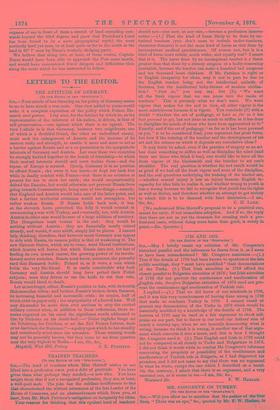TRAINED TEACHERS.
[TO THE EDITOR OT THE "SPECTATOR."]
SLE,—The herd of teachers whom Miss Shirreff wishes to see lifted into a profession owes you a debt of gratitude. You have given them what perhaps they needed,—a new idea. You have taught them that if not a recognised profession, they are, at least, a well-paid mob. The joke has the sublime indifference to fact that characterised the wittiest utterances of the late Leader of the House of Commons, and an abstractiveness which frees you, at least, from Mr. Mark Pattison's castigation on incapacity for ideas.
Your reasons for thinking that this opulent herd of teachers
should not—just now, at any rate,—become a profession deserve notice :—(1.) That the kind of harm likely to be done by un- trained teachers (you don't seem to include under-teachers, character-formers) is not the same kind of harm as that done by imcompetent medical practitioners. Of course not, but is it a kind of harm more subtle, much wider, and equally real? I assert that it is. The harm done by an incompetent teacher is x times greater than that done by a clumsy surgeon or a badly-reasoning- journalist, because the teacher can make a hundred bad surgeons and ten thousand loose thinkers. If Mr. Pattison is right as to English incapacity for ideas, may it not in part be due to- the English teacher being not the intellectual midwife of Socrates, but the intellectual baby-farmer of modern civilisa- tion? "Just so," you may say, but (2), "We want all the fresh vigour that we can press into the ranks of teachers." This is precisely what we don't want. We want vigour that makes for the end in view, all other vigour is the- more mischievous because it is vigour. You conclude (3) with a doubt "whether the art of pedagogy, at least so far as it has been pursued as yet, has not done as much to stiffen as it has done to discipline the minds of those who have been apprenticed to it"- Exactly, and if the art of pedagogy," so far as it has been pursued as yet, "is to be considered final, your argument has great force, but how if the training of the teacher and the development of his art and the science on which it depends are correlative ideas?
It may fairly be asked, even if the practice of surgery as an art has done something to stiffen as well as discipline the mind (and there are those who think it has), one would like to have all the fresh vigour of the blacksmith and the butcher to set one's shoulder. The real question is whether the net result would be as good if we had all the fresh vigour and none of the discipline, and the real questions underlying the training of the teacher are, —whether mental injury is less an injury because English in- capacity for idea fails to realise it, and whether wrong to youth is- less a wrong because we fail to recognise that youth has its rights as well as duties, and therefore whether an attempt to get society to admit this is to be damned with faint dismission.—I am,.
[We understood Miss Shirreff's proposal to be a practical one, meant for early, if not immediate adoption. And if so, the reply that there are not as yet the elements for creating such a pro- fessional caste, without doing more harm than good, is surely is point.—En. Spectator.]


































 Previous page
Previous page